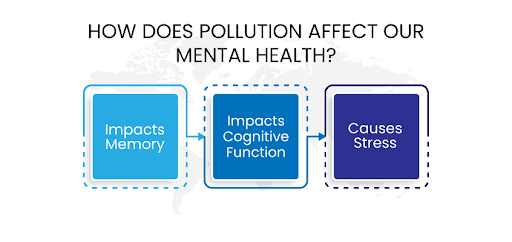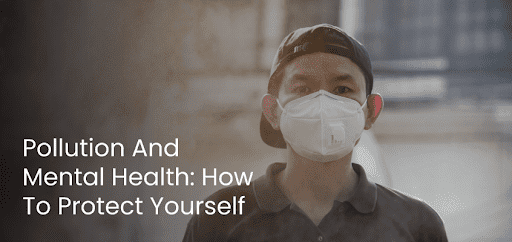SometimesIntroduction
For decades, researchers have spoken about the impact of pollution on individuals’ respiratory and cardiovascular systems. However, the lesser-known fact is that water, air, and soil pollution can harm affected people’s minds.
Our Wellness Programs
What is the hidden link between pollution and mental health?
Pollution does not come to mind when considering factors that impact an individual’s mental health.
- According to recent studies, those who experience air pollution exposure in their early childhood or formative years have a higher risk of suffering from mental illness.
- The study concluded that although the risk factor of air pollution on mental health is lower than that of family history, it still is a significant contributor to the world’s mental health crisis.
- Another study found that even the slightest increase in air pollution and delicate particulate matter over a year can have a lasting impact even seven years after the initial exposure.
- Similarly, rising levels of lead in drinking water sources have also shown to be detrimental to children’s developing brains.
- Conversely, research has shown that noise pollution increases anxiety, depression, strokes, and high blood pressure.
Looking for services related to this subject? Get in touch with these experts today!!
Experts

Banani Das Dhar

India
Wellness Expert
Experience: 7 years

Shariha

India
Psychologist
Experience: 8 years

Preethi Jain

India
Psychologist
Experience: 15 years

Devika Gupta

India
Wellness Expert
Experience: 4 years

Trupti Rakesh valotia

India
Wellness Expert
Experience: 3 years
What are the Effects of Pollution on Mental Health?
While it is difficult to determine how closely pollution affects mental health, researchers have suggested a strong link between corruption and depression, schizophrenia, personality diseases, and bipolar disease. Some significant observations lead researchers to believe a hidden connection between pollution and mental health.
- More visits to mental health centres on days of increased particulate matter pollution.
- There is an 18-39% increase in common mental health disorders when there is an interquartile increase in the range of nitrogen oxide and delicate particulate matter in the air.
- Various studies have also found that an increase in particulate matter, nitrogen dioxide, ozone, and sulphur dioxide correlated with higher numbers of suicide.
- Children exposed to higher pollution at 12 are 3 to 4 times more likely to get depression at 18 years.
- A 10% increase in noise around airports showed a 28% rise in the use of anxiety medication for people living near airports.
How Does Pollution Affect Our Mental Health?

The neurological effects of air, water, and noise pollution increase inflammation in the brain due to exposure to particulate matter. The increase in cytokinins, molecules related to the body’s inflammatory response, can cause depression and anxiety. Extended exposure to neuroinflammation can also result in central nervous system disorders such as Alzheimer’s and Parkinson’s.
1. The Impact of Pollution On Memory
Older women living in regions with high pollution were 40% more prone to developing dementia than those living in the least populated parts of the same area.
2. The Impact of Pollution On Cognitive Function
Along with mental health, air and water pollution can also result in a high risk of cognitive impairment and the ability to make decisions. A study found that higher levels of air pollution indoors resulted in chess players being unable to make strategic decisions under high stress and pressure conditions. On the other hand, noise pollution reduces the ability of a child to recognise similar sounding words or pick up new words.
3. The Impact of Pollution On Stress
Experiencing nighttime noise has been shown to reduce the quality of an individual’s sleep while also increasing vascular damage and higher than normal stress hormone levels.
How Can You Protect Yourself from the Effects of Pollution and mental health issues?
While there are a lot of suggestions as to how to control pollution outdoors, it is also essential that we take extra precautions to avoid the build-up of pollution indoors. These changes in your day-to-day activities can help reduce the pollution inside your homes.
1. Ventilation
The best way to reduce the number of pollutants in your home’s air is to improve ventilation. So especially in the kitchen when cooking. Ventilating with clean outside air and supplementing it with air cleaners like air filtration units can help you and your family with cleaner air.
2. Ban Indoor Smoking
Both firsthand and second-hand smoke can be harmful to health. Smoke contains 250 poisonous chemicals, out of which 70 are deemed to be carcinogenic. Avoiding smoking in the house can positively impact your home’s air quality.
3. Improve Quality of Water
Since our body is 70% water, the water we put in it must be well purified. Sometimes you have children in the house. Investing in a good quality water purifier and getting it serviced regularly is best.
4. Find Your Quiet Space
Living in a quiet area or finding at least some space in your home. Then you spending some quiet time can be highly beneficial.
Conclusion
Although pollution may not be the sole reason for mental health issues, there is a definite link between the two that we cannot ignore. Sometimes you are already feeling the after-effects of pollution on your mental health. Then try combating it with simple changes in your lifestyle. Manage stress and depression with the help of yoga and meditation. Try journaling when you want to get more clarity of thought. You can also adjust your diet to be healthier and exercise. Getting enough sleep and sunlight can also go a long way in improving your mental health. If all else fails, seek medical professionals with diverse expertise who are well versed in dealing with such difficulties and improving your mental health. United We Care has professionals in Canada with years of experience handling various mental health issues.


















